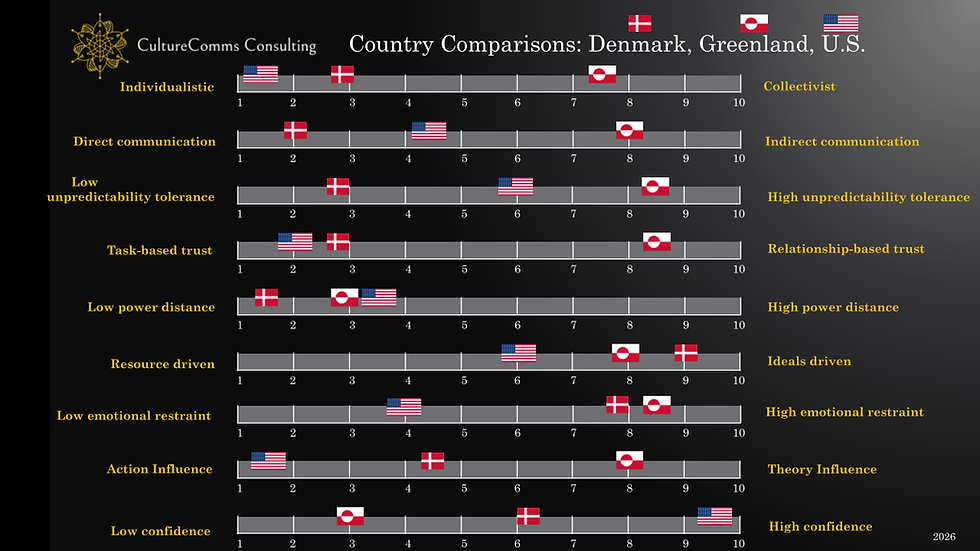What Is “Global Culture”? And Are You a Part of It?
- adamraelson
- Apr 19, 2025
- 3 min read
In our work helping professionals from around the world collaborate more effectively, we’ve spent years exploring how cultural values shape communication, leadership, and trust. We often talk about contrasts: direct vs. between-the-lines communication, task-based vs. relationship-based trust, high vs. low unpredictability tolerance, high vs. low power distance, and more.
But there’s something else we’ve observed: in global corporations, start-ups, and expat communities, people from vastly different backgrounds often begin to act, lead, and communicate in surprisingly similar ways. And maybe this includes you.
So, is there such a thing as a “global culture”?
What is Global Culture?
We define global culture as a shared set of behaviors, values, and communication norms that have emerged among people who work, live, and socialize across borders. It’s not tied to nationality. I’s shaped by context.
People who operate in global teams, lead across time zones, or live abroad, or even work remotely often adapt their style, not just out of necessity, but because a new, hybrid way of working is forming. Global culture doesn’t erase local identity, but it softens and blends cultural dimensions.
What Are the Traits of Global Culture?
Trust: Shifts toward task-based, but empathy and relationships still matter.
Communication: Tends to be more clear, and direct, especially in English.
Emotional restraint: Emotional expression is welcome, but usually moderated.
Time: Deadlines matter, but there’s room for flexibility.
Power distance: Flatter hierarchies and inclusivity are encouraged.
Influencing: Facts and logic are important, but storytelling is gaining ground.

Why Is This Culture Emerging?
Several forces are accelerating this shift:
Increased mobility due to international careers, travel, and remote work.
English as the dominant language of global business.
Tech tools like Zoom, Slack, LinkedIn shaping how we talk.
Education abroad and multicultural teams.
Shared experiences like the pandemic, climate change, and digital transformation.
Increased exposure to pop culture from YouTube, social media content creators, and influencers.
Global companies are expanding into more markets and company values are expected to be adopted by all.
And yes, Western cultural influence. Many global companies have defined values or working styles based on these baseline cultural values.
We must acknowledge that many of the values tied to global culture: directness, autonomy, informal communication, feedback reflect Western norms, especially from the U.S., U.K., and Northern Europe. That doesn’t mean they’re universal or superior. It means we need to recognize and approach them consciously.
Are You Part of Global Culture?
You might be if:
Most of your colleagues or social life is made up of people from many different countries.
You give feedback more freely than before, or maybe more readily than you would in your native culture.
You value autonomy and informal leadership.
You feel more “yourself” working in English than in your native language.
You feel more attuned to values like individuality, inclusion, and equality at work.
While many of these values may reflect certain Western ideals, they are becoming embedded in what many see as the language of global professionalism. That said, how they are interpreted and accepted still varies by country, context, and individual.
So, What Do We Do With This?
We also see that globally mobile professionals are naturally shifting into this shared culture. And they are able to code-switch. That means they know how to behave and interact according to the styles of their native culture, yet they can adjust at the right time and place into the patterns of global culture. And over time, it becomes part of their identity.
Global culture is real, growing, and powerful. But it’s not neutral. It’s important to:
Recognize it as a culture of its own, not just the “default”.
Balance it with local awareness
Keep asking: What works best here, with these people, at this moment?
Company culture often becomes the “shared language” in global teams. It may reflect global norms more than local ones, but employees help define and reinforce it through their actions.
Global culture, like all cultures, is dynamic and changing. It emerged from certain Western ideals, but it’s now being shaped by voices, values, and experiences from around the world.
Working globally isn’t about choosing between “your way” and “their way.” It’s about developing a new, shared way and staying open to all the ways we bring value, identity, and meaning into the workplace.
Want to explore how global culture is shaping your team or leadership style?




Comments